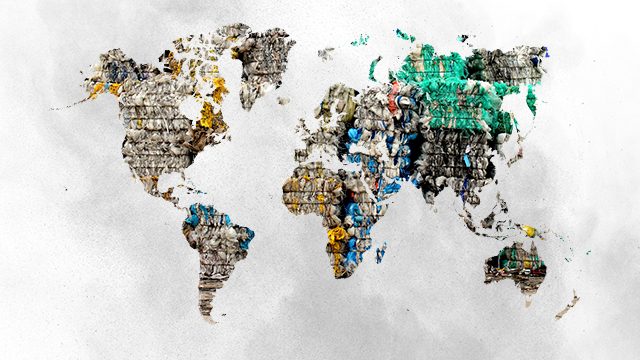SUMMARY
This is AI generated summarization, which may have errors. For context, always refer to the full article.

MANILA, Philippines – In less than a week, the Philippines managed to re-export two shipments of trash: the remaining 69 containers from Canada and one container from Hong Kong. Canada’s trash lingered on Philippine soil for 6 years, while Hong Kong’s cargo remained for only about 4 months.
There was little time for environmental groups to rejoice as trash from South Korea and Australia still remain in the country.
But what they fear the most, Greenpeace Southeast Asia-Philippines country director Lea Guerrero said, is that more trash may still manage to sneak in if the government does not immediately find a way to completely block all waste from entering the country in the first place.
A day before Canada took back its garbage and on the day Hong Kong also shipped back theirs, environment groups were calling on the government to already impose a surefire ban on waste imports.
These groups also called on the Philippines to ratify the Basel Ban Amendment, a treaty that specifically stops countries from exporting hazardous waste to developing nations.
The call for an immediate and comprehensive total ban is especially timely as the Philippines also continues to deal with both foreign and locally-produced plastic waste building up in the country’s waters and land territories.
Regional trends
While the Philippines is not a big player in the plastic waste trade compared to its Southeast Asian neighbors, Greenpeace data shows that the country saw a 178.88% jump in imports from 4,267 tons in 2017 to 11,900 tons in 2018.
The country’s imports look small compared to Malaysia, the region’s current top plastic waste importer which saw a 58.72% year-on-year increase to a whopping 872,797 tons in 2018 from the previous year.
Following Malaysia were: Thailand, which saw a 212.09% year-on-year increase in imports to 481,381 tons, and Indonesia which took in 320,452 tons, or 148.51% more waste compared to 2017.
Environmental groups see these figures as ominous.
Guerrero told Rappler that since the data only covers waste shipments that were accounted for, it is possible that more shipments of trash could have snuck into these developing countries without the knowledge of authorities.
Greenpeace already issued a warning last April 2013 about Southeast Asia becoming the dumping ground of developed countries’ garbage after China imposed stricter measures on its own waste imports.
China restrictions
China, which used to take in 51% of the world’s recyclable waste, according to Guerrero, finally implemented its strictest policy on solid waste imports last 2018.
Following China’s footsteps, a number of Southeast Asian countries – and even India – also moved to restrict the entry of waste into their ports within that same year to avoid the influx of trash from developed countries.
It was only in May 2019 that the Philippines followed suit, when the Department of Environment and Natural Resources (DENR) announced its plan to impose a total waste import ban through a department administrative order.
Prior to this proposed administrative order, the country itself had laws intended to protect the country from being a dumpsite. But these may not prevent misdeclared shipments posing as goods to be legally brought in.
Existing laws and a treaty
Republic Act (RA) 6969, or the Toxic Substances and Nuclear Wastes Control Act of 1990, monitors and regulates the importation and disposal, among other things, of chemical substances that may have adverse health and environmental impacts.
This law, however, still allows the importation of recyclable waste.
Meanwhile, RA No. 9003, or the Ecological Solid Waste Management Act of 2000, prohibits the “importation of toxic wastes misrepresented as ‘recyclable’ or ‘with recyclable content.’”
Should the DENR’s policy push through, even recyclable waste will no longer be allowed.
But before all of these laws were implemented, the Philippines was already a signatory to the Basel Convention on the Control of Transboundary Movements of Hazardous Wastes and their Disposal. It requires states receiving garbage to give their prior informed consent before the export of the garbage from other countries.
The convention also recently included plastic waste as among the products that would need the recipient’s permission before it gets imported.
The loophole
But the environmental groups remain unimpressed. Simply put, Guerrero told Rappler that they remain cautious and suspicious of the DENR’s plans simply because the agency supports waste-to-energy alternatives.
No Burn Pilipinas senior campaign manager Glenn Ymata, in a press conference last May 30, called the waste-to-energy option a “false solution.”
“You burn the trash to have energy, that’s a long debate. For us, it’s a no-no but I just want them to understand that if this continues, along with the twisted policies of the DENR, this will legitimize the burning of trash,” he said.
Ymata added that since the waste-to-energy venture will need a lot of trash to operate and fuel its facilities, this will still provide a window for foreign waste to enter the country. (READ:Waste-to-energy technologies in PH? ‘Go zero waste instead’)
But to get the government really moving, Guerrero said that strong political will is really needed – and it would have to come in the form of Duterte actually being vocal about it. (READ: Duterte’s trash threat embarrasses, infuriates Canadians)
“If it were an order from the President, instead of from DENR, then we’d have more coordination between the agencies,” she added.
“Mas malakas malamang ang stand ng President and magre-reflect ito sa [gagawin ng] DENR, sa Bureau of Customs,” she added.
(The President’s stand will likely be stronger and this would reflect on what the DENR and the Bureau of Customs will be doing.) – Rappler.com
Add a comment
How does this make you feel?
There are no comments yet. Add your comment to start the conversation.